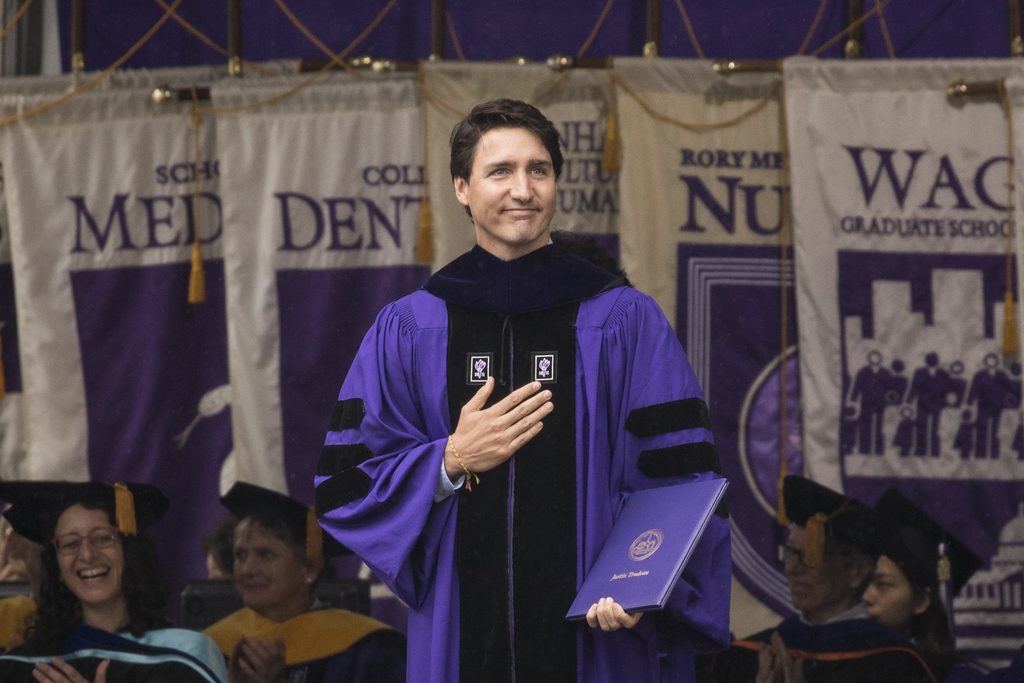On Wednesday, Justin Trudeau walked out onto the field of Yankee stadium; big-grinned, twinkle-eyed, ready to give the New York University class of 2018 commencement address. “He’s so good looking”, my friend observed. Not really my type, I told her. And I didn’t mean his appearance.
To his harshest critics, the current and 23rd Prime Minister of Canada is vain, vapid, and outrageously inefficient. Some of his controversies from earlier this year are his speaking tour in Canada when, in response to a question on national security, he seemed to equate Islamic State terrorists with refugees from the Second World War. Then followed his India trip — a diplomatic disaster, by any standard — when he decided to have a one-on-one dinner with a convicted extremist, Jaspal Atwal. This week, however, he found a faithful fan base in New York City.
In receiving his honorary degree, Trudeau was introduced by NYU faculty as being one of the most “enlightened and progressive leaders” of our time. He took to the stage to impart some words of wisdom. As a new graduate myself, I sat in the rain, arms crossed — prepared to be underwhelmed. But I was pleasantly surprised.
Trudeau wanted to offer us, new graduates, a “challenge.” He was emphasising the need to be able to “truly listen” to those we disagree with. We can’t solve problems, he said, “if we cocoon ourselves in an ideological, social or intellectual bubble.” Indeed. New York University, like most elite universities in America, is most certainly an ideological bubble. As I have written previously, I experienced this firsthand, being nicknamed a “cultural fascist” by my class for expressing a belief in objective standards in art. And being unable to discuss, honestly and fairly, the motivations of many Trump supporters.
In an environment where the acceptable parameters of dissent are so narrowly drawn — like on “reproductive rights” or gender fluidity — the widespread practice of self-censorship among students and professors is inevitable. For those still sceptical of this, Heterodox Academy, a politically diverse academic membership association devoted to improving viewpoint diversity in universities, have noted a worrying generational shift, as well as the certainty of the problem.
But in his speech, Trudeau implored us, students, to get aboard the openness train: “There’s not a religion in the world that asks you to tolerate thy neighbour… so let’s try a little more like acceptance, respect, friendship — yes, even love.” This was met with rapturous applause.
Yes-yes; but isn’t intellectual rigour the real point here? Overlooking the obvious log in his own eye — how tolerant is Canada? — Trudeau continued by commenting on polarisation.
“Humanity has to fight our tribal mindset. We go to the same church? Cool. You’re in my tribe. You speak my language? You’re in my tribe. You’re an NYU alumni? (Met with loud cheers from the student body; undermining his point)… you like the Yankees, you go to the gun range, you’re pro-choice? Tribe, tribe, tribe.”
Polarisation is indeed a problem. But not because deep down we’re all one — as in “imagine all the people” — but because the pursuit of truth via reason is impossible if ideology is not checked against evidence. And viewpoint diversity — exposure to alternative perspectives — is the best way to do that. No matter our worldview, we all need to be challenged. And the fundamental premise championed by Heterodox Academy is that it ought not to matter where good ideas originate.
And that’s precisely how Trudeau exceeded my expectations. He said: “Here’s my main point, and the challenge I’m offering you today, our celebration of difference needs to extend to differences of values and beliefs, too. Diversity includes political and cultural diversity. It includes diversities of perspectives and approaches to solving problems,”
I couldn’t agree more — and I only wish he’d developed this further.
Instead, Trudeau anticipated a very legitimate concern. He said, “this is not an endorsement of moral relativism or a declaration that all points of view are equally valid.” Without clarity, however, this is merely lip service. Academic institutions are knee-deep in moral relativism. And why is that so dangerous? Because it is an assault on both truth and reason. As I have argued elsewhere, it reduces the standard of debate to “I feel, therefore it is.”
However, Trudeau ended by telling us students that we ought to let ourselves “be vulnerable to another point of view.” For true courage is the ability “to open yourself to another conviction” and to take seriously “the validity of their perspective.” This is true, insofar as an ability to engage with more than mere strawmen. And a helpful reminder for the class of 2018 — and for us all.
Sincere or otherwise, good ideas can come from anywhere. Even from Justin Trudeau. A broken clock, they say, is right twice a day; Trudeau, more like twice a lifetime. Anyway, hats off (and tossed in the air?) to him — for saying something sensible.























